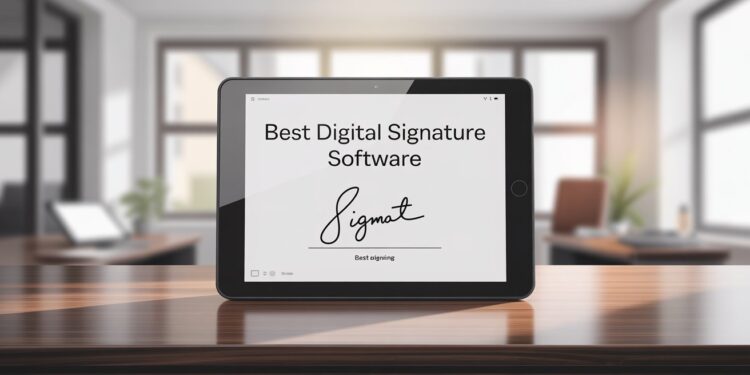Digital signature software is a software application that enables users to sign digital documents securely and electronically. It uses a cryptographic method to verify the signer’s authenticity and the document’s integrity. The digital signature software typically generates a unique signature for each signer using a private key. The digital signature and timestamp and a digital certificate verifying the signer’s identity are added to the document. This process ensures that the document has not been tampered with since it was signed.
Digital signature software is widely used in various industries, including finance, legal, healthcare, and government, for electronically signing contracts, agreements, and other legal documents. It provides a more efficient and secure way of signing documents than traditional pen-and-paper methods. It eliminates the need for physical signatures and reduces the risk of fraud or forgery.
Some popular digital signature software includes DocuSign, Adobe Sign, HelloSign, SignNow, and PandaDoc. These tools offer a range of features, such as customizable templates, integrations with other software applications, and mobile-friendly interfaces, to make the signing process simple and convenient for users.
Features:
Some shared characteristics of e-signature software providers become apparent upon closer inspection.
- Digitally signing a document
- Editing and annotating features
- Procedures for Verifying One’s Identity and Authenticity
- Models and layouts for signatures
- Storage of Records
- Methods for automating workflows (such as submission, approval, and confirmation)
- Individual Branding Choices
- Limitations on Entry
- Encryption and safety
- Verification procedures
- Customized Document Layouts (such as invoices, claims, or job applications)
- Availability of digital pen support
- Compatibility with Apple and Google’s mobile operating systems
Numerous companies now offer integrations between their e-signature platforms and popular corporate applications like Salesforce, Box, Dropbox, and Google Drive. Companies can deploy many of these products via private cloud alternatives, but most suppliers provide cloud-based software-as-a-service pricing.
A Few Advantages Of Electronic Signature Programs
The program streamlines transmitting and receiving contracts and other documents requiring a digital signature for remote workers. Electronic signature software can be used to process documents, negating the need for remote workers to have access to a scanner or printer. Virtual document distribution is made possible using pre-built templates, and staff members are alerted as soon as the paperwork is signed and returned.
By allowing signers to receive, evaluate, and sign contracts electronically, businesses may provide a more streamlined service to their clientele. Additionally, by integrating with customer relationship management systems, clients are alerted when agreements are received, read, and signed.
Documents may be tracked and moved around in a system with an audit trail, and any alterations to contracts can be uncovered. The system can record details like who signed, when, where, and with whom a document was exchanged after it had been signed. The fulfillment of compliance regulations may also depend on this.
The program saves businesses money by eliminating the need for paper copies of contracts, thereby reducing expenses associated with printing and storing documents. Paper, printers, fax machines, pens, and ink/toner are just some of the office supplies that can be replaced by e-signatures, resulting in cost savings.
Here Are The Ten Best Digital Signature Software Tools in Detail:
1. DocuSign
DocuSign is one of the most popular and widely used digital signature software tools. It offers a range of features, including e-signature capabilities, document management, and workflow automation. DocuSign integrates with various third-party applications, including Salesforce, Dropbox, and Microsoft Office. It is known for its easy-to-use interface and robust security features.
2. Adobe Sign
Adobe Sign is a digital signature software tool that offers a range of features, including customizable templates, automatic reminders, and mobile-friendly interfaces. It integrates with various Adobe products, including Acrobat, Creative Cloud, and third-party applications like Microsoft Teams and Salesforce. Adobe Sign offers advanced security features like two-factor authentication and document encryption.
3. HelloSign
HelloSign is a digital signature software tool offering various features, including customizable templates, API integration, and mobile-friendly interfaces. Users can sign documents electronically using their mouse or trackpad or by uploading a photo of their signature. HelloSign integrates with various third-party applications, including Dropbox, Google Drive, and HubSpot.
4. SignNow
SignNow is a digital signature software tool offering various features, including customizable templates, document management, and mobile-friendly interfaces. Users can sign documents electronically using their mouse or trackpad or by uploading a photo of their signature. SignNow integrates with various third-party applications, including Salesforce, Office 365, and Google Drive.
5. PandaDoc
PandaDoc is a digital signature software tool offering various features, including customizable templates, document tracking, and workflow automation. Users can create, send, and sign documents electronically, collect payments, and create legally binding contracts. PandaDoc integrates with various third-party applications, including Salesforce, HubSpot, and Zapier.
6. SignRequest
SignRequest is a digital signature software tool offering various features, including customizable templates, document management, and mobile-friendly interfaces. Users can sign documents electronically using their mouse or trackpad or by uploading a photo of their signature. SignRequest integrates with various third-party applications, including Google Drive, Dropbox, and Zapier.
7. SignEasy
SignEasy is a digital signature software tool offering various features, including customizable templates, document management, and mobile-friendly interfaces. Users can sign documents electronically using their finger or stylus on their mobile device or by uploading a photo of their signature. SignEasy integrates with various third-party applications, including Google Drive, Dropbox, and Box.
8. OneSpan Sign
OneSpan Sign is a digital signature software tool offering various features, including customizable templates, document management, and workflow automation. Users can sign documents electronically using their mouse or trackpad or by uploading a photo of their signature. OneSpan Sign integrates with various third-party applications, including Salesforce, Microsoft Dynamics, and SharePoint.
9. RightSignature
RightSignature is a digital signature software tool offering various features, including customizable templates, document management, and mobile-friendly interfaces. Users can sign documents electronically using their mouse or trackpad or by uploading a photo of their signature. RightSignature integrates with various third-party applications, including Google Drive, Salesforce, and Dropbox.
10. DocHub
DocHub is a digital signature software tool offering various features, including customizable templates, document management, and mobile-friendly interfaces. Users can sign documents electronically using their mouse or trackpad or by uploading a photo of their signature. DocHub integrates with various third-party applications, including Google Drive, Dropbox, and Box.
Conclusion:
In conclusion, many excellent digital signature software tools are available, each with unique features and benefits. The top 10 tools include DocuSign, Adobe Sign, HelloSign, SignNow, PandaDoc, SignRequest, SignEasy, OneSpan Sign, RightSignature, and DocHub. These tools offer customizable templates, document management, mobile-friendly interfaces, and API integrations, among other features. They are also highly secure, with advanced security features such as two-factor authentication and document encryption. When selecting a tool, you must consider your specific needs and requirements to choose the best digital signature software for your business.






